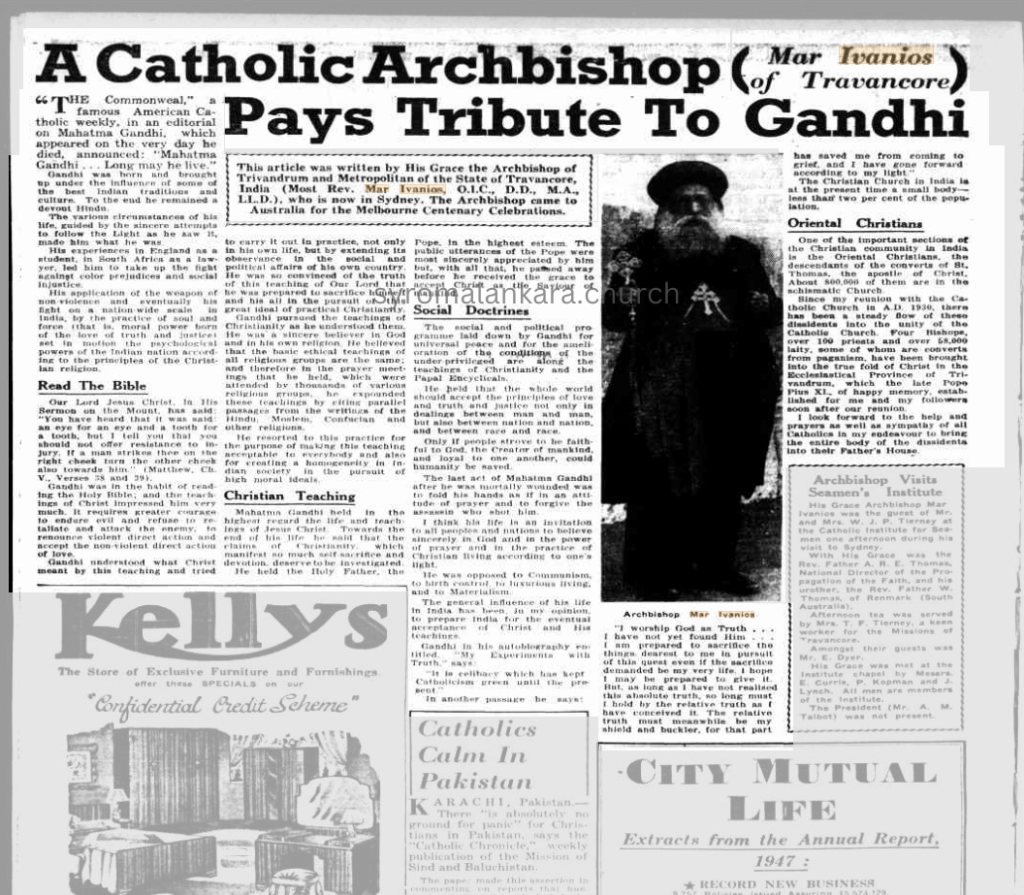“The Commonweal,” a famous American Catholic weekly, in an editorial on Mahatma Gandhi, which appeared on the very day he died, announced: “Mahatma Gandhi… Long may he live.” Gandhi was born and brought up under the influence of some of the best Indian traditions and culture. To the end, he remained a devout Hindu. The various circumstances of his life, guided by sincere attempts to follow the Light, as he saw it, made him what he was. His experiences in England as a student, in South Africa as a lawyer, led him to take up the fight against color prejudices and social injustice. His application of the weapon of non-violence and eventually his fight on a nation-wide scale in India, by the practice of soul and force (that is, moral power born of the love of truth and justice) set in motion the psychological powers of the Indian nation according to the principles of the Christian religion.
Read The Bible
Our Lord Jesus Christ, in His Sermon on the Mount, has said: “You have heard that it was said: an eye for an eye and a tooth for a tooth, but I tell you that you should not offer resistance to injury. If a man strikes thee on the right cheek turn the other cheek also towards him.” (Matthew, Ch. V., Verses 38 and 39). Gandhi was in the habit of reading the Holy Bible; and the teachings of Christ impressed him very much. It requires greater courage to endure evil and refuse to retaliate and attack the enemy, to renounce violent direct action and accept the non-violent direct action of love. Gandhi understood what Christ meant by this teaching and tried to carry it out in practice, not only in his own life but by extending its observance in the social and political affairs of his own country. He was so convinced of the truth of this teaching of Our Lord that he was prepared to sacrifice himself and his all in the pursuit of this great ideal of practical Christianity. Gandhi pursued the teachings of Christianity as he understood them. He was a sincere believer in God and in his own religion. He believed that the basic ethical teachings of all religious groups are the same; and therefore in the prayer meetings that he held, which were attended by thousands of various religious groups, he expounded these teachings by citing parallel passages from the writings of the Hindu, Moslem, Confucian, and other religions. He resorted to this practice for the purpose of making this teaching acceptable to everybody and also for creating homogeneity in Indian society, in the pursuit of high moral ideals.
Christian Teaching
Mahatma Gandhi held in the highest regard the life and teachings of Jesus Christ. Towards the end of his life, he said that the claims of Christianity, which manifest so much self-sacrifice and devotion, deserve to be investigated. He held the Holy Father, the Pope, in the highest esteem. The public utterances of the Pope were most sincerely appreciated by him but, with all that, he passed away before he received the grace to accept Christ as the Savior of mankind.
Social Doctrines
The social and political program laid down by Gandhi for universal peace and for the amelioration of the conditions of the underprivileged are along the teachings of Christianity and the Papal Encyclicals. He held that the whole world should accept the principles of love and truth and justice not only in dealings between man and man but also between nation and nation, and between race and race. Only if people strove to be faithful to God, the Creator of mankind, and loyal to one another, could humanity be saved. The last act of Mahatma Gandhi after he was mortally wounded was to fold his hands as if in an attitude of prayer and to forgive the assassin who shot him. I think his life is an invitation to all peoples and nations to believe sincerely in God and in the power of prayer and in the practice of Christian living according to one’s light. He was opposed to Communism, to birth control, to luxurious living, and to Materialism. The general influence of his life in India has been, in my opinion, to prepare India for the eventual acceptance of Christ and His teachings. Gandhi in his autobiography entitled, “My Experiments with Truth,” says: “It is celibacy which has kept Catholicism green until the present.” In another passage he says: “I worship God as Truth… I have not yet found Him… I am prepared to sacrifice the things, dearest to me in pursuit of this quest even if the sacrifice demanded be my very life. I hope I may be prepared to give it. But, as long as I have not realized this absolute truth, so long must I hold by the relative truth as I have conceived it. The relative truth must meanwhile be my shield and buckler, for that part has saved me from coming to grief, and I have gone forward according to my light.”
Oriental Christians
The Christian Church in India is at the present time a small body—less than two per cent of the population. One of the important sections of the Christian community in India is the Oriental Christians, the descendants of the converts of St. Thomas, the apostle of Christ. About 800,000 of them are in the schismatic Church. Since my reunion with the Catholic Church in A.D. 1930, there has been a steady flow of these dissidents into the unity of the Catholic Church. Four Bishops, over 100 priests, and over 58,000 laity, some of whom are converts from paganism, have been brought into the true fold of Christ in the Ecclesiastical Province of Trivandrum, which the late Pope Pius XI, of happy memory, established for me and my followers soon after our reunion. I look forward to the help and prayers as well as sympathy of all Catholics in my endeavor to bring the entire body of the dissidents into their Father’s House.
This article was written by His Grace the Archbishop of Trivandrum and Metropolitan of the State of Travancore, India (Most Rev. Mar Ivanios, O.I.C., D.D., M.A., L.L.D.), who is now in Sydney. The Archbishop came to Australia for the Melbourne Centenary Celebrations.
Copyright: Catholic Weekly (Sydney) 10th June 1948


